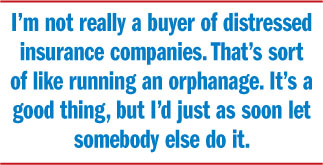If you own an underwriting agency with a very specialized, quality book of business—and have no plans to sell it—then Stephen Way may want to talk about making a deal.
The chair and CEO of Houston International Insurance Group (HIIG), which added to its portfolio in February Birmingham, Ala.-based managing general underwriter Casualty & Surety Inc. (CSI), a specialist in mining and energy risks, says he's on the hunt for more acquisition targets—but that only MGUs without “For Sale” signs attract his attention.
 “Some deals get flogged around everywhere”—getting sent to 50 or so potential buyers, Way says. “On the deals we prefer, we may be one of only two parties” looking at an MGU.
“Some deals get flogged around everywhere”—getting sent to 50 or so potential buyers, Way says. “On the deals we prefer, we may be one of only two parties” looking at an MGU.
Recommended For You
Want to continue reading?
Become a Free PropertyCasualty360 Digital Reader
Your access to unlimited PropertyCasualty360 content isn’t changing.
Once you are an ALM digital member, you’ll receive:
- Breaking insurance news and analysis, on-site and via our newsletters and custom alerts
- Weekly Insurance Speak podcast featuring exclusive interviews with industry leaders
- Educational webcasts, white papers, and ebooks from industry thought leaders
- Critical converage of the employee benefits and financial advisory markets on our other ALM sites, BenefitsPRO and ThinkAdvisor
Already have an account? Sign In Now
© 2025 ALM Global, LLC, All Rights Reserved. Request academic re-use from www.copyright.com. All other uses, submit a request to [email protected]. For more information visit Asset & Logo Licensing.








